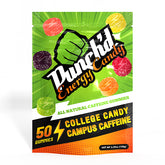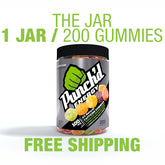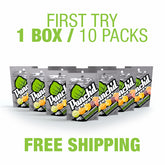10 Tips For Cutting Processed Sugar From Your Family’s Diet
Avoiding sugar is one of the most challenging parts of maintaining a healthy diet for a lot of people.
One of the reasons sugar is so dangerous is that it is very hard to quit. Your brain treats it like a drug — the more you eat, the more you crave.
Queensland University of Technology neuroscientist and professor Dr. Selena Bartlett led a 2016 study that showed that consuming excess sugar elevates dopamine levels, which control the brain’s pleasure center, in a similar way it does for drugs such as tobacco and cocaine. This explains the consume/crave cycle associated with sugar.
This vicious cycle leads to overconsumption of an unnecessary source of calories, a habit that can contribute to obesity, diabetes, cardiovascular disease and other health issues.
How Much Is Too Much Sugar?
The American Heart Association (AHA) recommends that kids aged 2-18 and women should have less than 25 grams, or 6 teaspoons, of added sugar daily. Men should only be consuming about 36 grams, or 9 teaspoons, a day.
What does that look like? Registered dietician Natalie Olsen breaks down the sugar content of popular food items to give you some perspective on those AHA numbers:
-
Snickers bar (57 g) = 5.83 teaspoons of sugar
-
Milky Way bar (58 g) = 7.02 teaspoons of sugar
-
Coca-Cola (one can, 330 ml) = 7.25 teaspoons of sugar
-
Red Bull (one can) = 5.35 teaspoons of sugar
-
Honey Nut Cheerios: 6.67 teaspoons of sugar
-
Raisin Bran (100 g) = 6.35 teaspoons of sugar
Notice that these guidelines refer to added sugar. That is an important distinction to understand when discussing sugar intake.
The Difference Between Added Sugar and Natural Sugar
It isn’t that all sugar is bad for you. It’s all the added, or processed, sugar in food that is mostly responsible for weight gain and other health problems.
Not sure of the difference?
The American Academy of Family Physicians explains that natural sugar is found in unprocessed foods that provide additional nutritional value. These include fruits (they contain a sugar called fructose), vegetables, animal dairy (they contain a sugar called lactose) and some grains.
Added sugar provides no nutritional value and is found in processed foods and drinks like candy, cakes, cookies, ice cream, pies, soda, juice drinks, sports drinks and a number of other similar categories of food and drink.
The effects that each has on your body are important to understand. Registered dietician Keri Glassman explains that added sugars cause inflammation and a sugar spike while your body quickly changes the sugar to fat because it isn’t being used. Natural sugars, on the other hand, are often found in foods that contain other nutrients, such as protein and fiber, which can help your body digest the sugar more slowly, eliminating the sugar spike and conversion to fat.
When you consume too much added sugar, your body uses the energy so quickly that it wants more food more often, causing you to overeat and gain weight. That’s the bad news.
The good news is there are simple steps you can take to cut out your family’s overall intake of added sugar.

Tips For Reducing Your Family’s Intake of Added Sugar
Reducing the amount of processed sugar your family consumes is a task worth undertaking because of the health benefits. Even small changes will make a big impact on your family’s health in the long run.
1. Cut Back Slowly
Don’t expect to quit sugar cold turkey. It isn’t a sustainable solution to your sugar problem. Dr. Priya Khorana, a nutrition consultant, advises people to practice moderation and cut back on sugar gradually so that it is a sustainable lifestyle change.
Doing it drastically and suddenly is shocking for your body. “You need to reset your appetite and brain,” says internist Dr. Partha Nandi. Slow changes will help you stay on track. For example, swap out regular soda for diet soda until you get accustomed to drinking water instead.
2. Read Food Labels
This is a great habit to get into for a lot of reasons, but it can be especially helpful for identifying and eliminating sugar.
There are 61 different names for sugar that can pop up on an ingredient label, explains the team at Sugar Science, published by the University of California, San Francisco. Sucrose, high-fructose corn syrup, caramel, honey, molasses, dextrose, glucose and raw sugar, are just a few examples.
The challenge is in determining which sugars are added and which are natural. “While product labels list total sugar content, manufacturers are not required to say whether that total includes added sugar, which makes it difficult to know how much of the total comes from added sugar and how much is naturally occurring in ingredients such as fruit or milk,” the Sugar Science team writes. “That makes it very difficult to account for how much added sugar we're consuming.”
That’s changing, however. New FDA guidelines will require all food manufacturers to list added sugars to their nutrition labels by January 1, 2021. Some manufacturers are already complying with that new standard.
So, check for the “Added Sugars” line on a food item’s nutrition label first. That’s listed under “Total Carbohydrates.” If a manufacturer isn’t yet listing added sugars, check the ingredients list for the various forms of sugars that could be in there.
3. Eat More Whole Foods
Whole foods have not been processed or refined, which means they are free of additives and artificial ingredients. Eating foods in their natural states ensures you aren’t ingesting any added sugars. You also have the benefit of knowing exactly what is in your food.
A balanced, whole-food diet will focus on fruits, vegetables, lean meats, poultry, fish, nuts, seeds and unprocessed grains.
4. Eliminate Sugary Drinks
Sugar-sweetened beverages are among the most serious offenders for adding extra calories from added sugars, the team at Harvard T.H. Chan Public School of Health writes.
Dave Mosher and Diana Yukari at Business Insider have a chart that shows the sugar content of popular drinks in the US. The five drinks with the most sugar per container are:
-
Rockstar Energy Drink — 60 grams
-
Monster Energy Drink — 54 grams
-
McDonald’s McCafe Mocha — 53 grams
-
Lipton Iced Tea — 53 grams
-
Arizona Iced Tea — 52.5 grams
Instead of consuming beverages that contain so much added sugar, the state of Rhode Island’s Department of Health recommends a few alternatives:
-
Water, to which you can add fresh fruit for flavoring
-
Unsweetened iced tea
-
Low-calorie hot chocolate
Whatever you can do to eliminate those sweet drinks will have a huge impact on your family’s overall health.
5. Avoid Sauces and Condiments With A Lot of Sugar
Barbecue sauce, ketchup and tomato sauce are loaded with added sugar. A single tablespoon of ketchup can have as much as 4 grams of sugar. The quantities in which most people consume these sauces contribute significantly to many people’s sugar levels.
"Most important is portion control," says registered dietician Constance Brown-Riggs. "Condiments should be used to enhance the flavor of food and not serve as the main course." So, if you must use them, don’t drown your food with them.
Or, instead of relying on these for food flavoring, try using a variety of other herbs, spices and spreads. Dried herbs and spices, cinnamon, nutmeg, yellow mustard, vinegar and pesto are all delicious options that can add depth of flavor without the sugar punch.
6. Snack Smart
Snacking throughout the day is a common habit for many of us, but there are smart choices and not-so-smart choices for snacking. The best thing you can do to prevent yourself from reaching for an unhealthy choice is to remove all sugary treats from the house. Then, stock the pantry and refrigerator with smart, no-sugar-added choices.
Fresh fruits, vegetables, nuts, hard-boiled eggs and avocados are great choices for healthy snacking. But sometimes you might be craving something a little more creative. This list of no-sugar snacks from Greatist might be just what you are looking for.

7. Choose a Better Breakfast
Breakfast is an important meal because what you eat for breakfast sets the tone for how your body metabolizes food throughout the rest of the day, according to a WebMD article reviewed by Brunilda Nazario, MD. A low-sugar, high-protein and high-fiber breakfast will keep your blood sugar steady and help you stay full until lunch. Then, you aren’t as likely to overeat or suffer the sugar highs and lows associated with a sugary breakfast.
Foods like cereal, pancakes, waffles, granola and muffins are some of the highest-sugar breakfast foods. For a better start to your day, choose items like eggs (cooked any number of different ways), avocados, Greek yogurt with fruit and whole-grain toast with a protein.
8. Consider Natural Sweeteners
Avoid artificial sweeteners at all costs, chiropractor and clinical nutritionist Dr. Josh Axe says. These sweeteners, while marketed as zero calorie and better for you than sugar, are actually more detrimental to your health. They are actually sweeter than table sugar, so when you eat artificial sweeteners, you actually crave more. So, rather than fulfilling a sugar craving, artificial sweeteners cause your body to want more sugary foods.
Instead of substituting processed sugar with artificial sweeteners, make those substitutions with natural sugars like raw honey, cocoa and vanilla, Dr. Axe says.
9. Create Meal Plans
The best way to control how much sugar your family consumes is to plan meals. By planning meals, doing the shopping yourself and cooking at home, you control what is in your meals and what is served to your family. Planning out meals ahead of time also helps ensure you stick to making healthy choices about the sugar content of your meals.
10. Get More Sleep
A 2018 study by Dr. Hugues Sampasa-Kanyinga, Dr. Hayley Hamilton and Dr. Jean-Philippe Chaput found that when middle school students didn’t get enough sleep at night, they consumed more energy drinks and sugar-sweetened beverages throughout the day.
Being tired puts your mind and body at risk for poor decision-making when it comes to choosing foods. When tired, people tend to choose less healthy options to fill a void and get a quick sugar high for energy. By getting a full night’s rest, you are more alert and able to make smarter dietary choices that are attuned to your body’s needs.
Kicking a sugar habit isn’t easy, but it is a commitment worth making for your own health, as well as for the health of your family. With a steady effort to make good choices and avoid added sugars, you will be on the right path for healthier minds and bodies.
Images by: Mark Bowden/©123RF.com, Olga Kriger/©123RF.com, Sergey Gaydaenko/©123RF.com
Great resource on KETO DIETS!
https://www.ketogenicsupplementreviews.com/blog/keto-food-chart/









1 comment
Watch the movie FED UP! A calorie is not a calorie. The government and big businesses don’t care about us or our health, they only care about the money they are making from us.
This blog article speaks to the #1 issue in America right now. Lies in the food industry, Coca-Cola advertising that it has only good intentions for its consumers. Big Soda needs to go the way of Big Tobacco. There is no reason to drink a sugary beverage, you will not benefit from it at all. Obesity and metabolic disease is an epidemic, 95% of Americans will be obese in 10 years, 1 in 3 will have diabetes if we continue down this path.
Reduce your daily sugars, put down that soda, grab a water and some Punch’d Gummies instead. You will look and feel better and avoid a lifetime of medical ailments and pain.
http://fedupmovie.com/#/page/about-the-issue